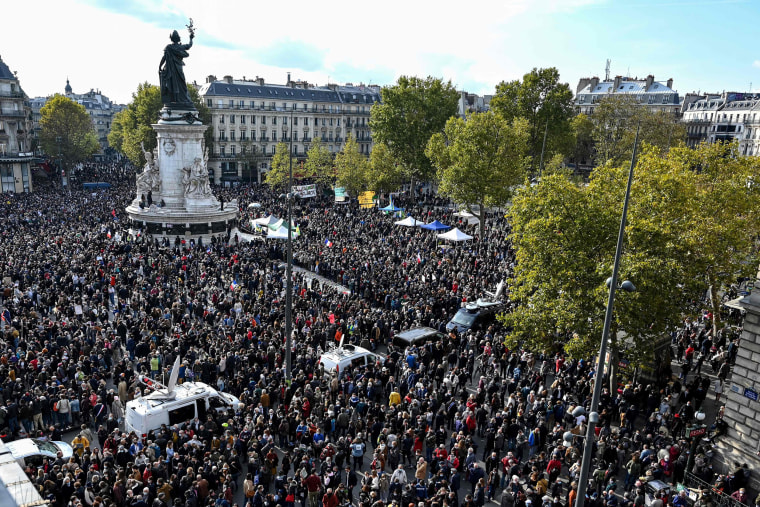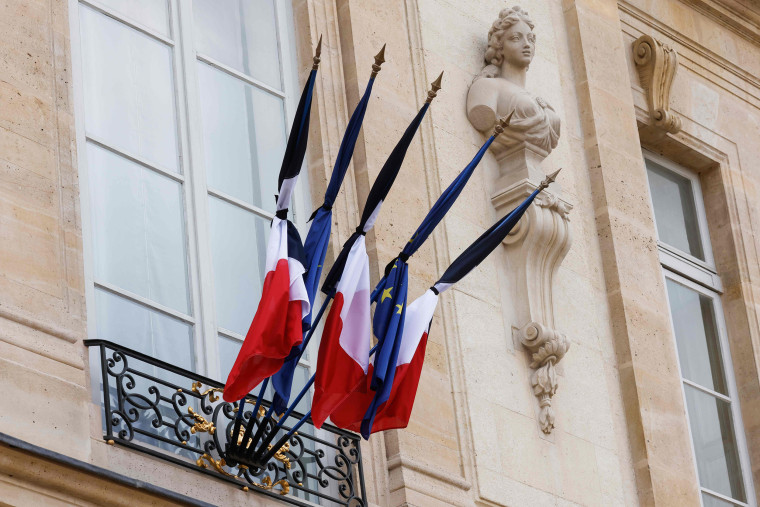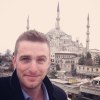Secularism/France Have Walked Hand/n/Hand Teacher Decapitation Given2nd Thoughts
CONFLANS-SAINTE-HONORINE, France — Dozens of teens stood shivering in the dark, wet streets near their school hours after hearing what should have been unthinkable: A Chechen refugee had decapitated their teacher for showing students caricatures of the Prophet Muhammad.
Martial Lusiela, 15, who was among them, said he was appalled by the murder but added that he had warned his instructor, Samuel Paty, that nothing good would come of showing the pictures.
"This is not a caricature you should show to the students, because there are Muslims in the class," Martial said he had told Paty at the time. "We are in a 'laïque' establishment. It could lead to problems."
Martial may have thought that laïcité — France's state-enforced secularism — meant his teacher should have avoided such polarizing religious discussions. But in the days since the murder, French politicians have had the opposite interpretation, offering laïcité as vindication both for the teacher's actions and for a sweeping crackdown on France's Muslim minority.

For more than a century, "laïcité," which was meant to separate the French state from the influence of the Roman Catholic Church, was considered a sacred pillar central to France's liberal consciousness. But some political theorists say its meaning has recently been corrupted and weaponized by the political right.
"The new 'laïcité' ... it's not a legal and philosophical principle anymore," said the philosopher and sociologist Raphaël Liogier, a professor at Sciences Po Aix-en-Provence. "It's become a tool to target people we consider the enemies of our culture."
The official government hommage for Paty was a solemn spectacle held in an ornate courtyard on Wednesday night at Sorbonne University. Paty’s casket was carried into the ceremony to the tune of U2’s “One” — the first of several bittersweet pop songs that played among elegies, poems and prayers recited by the slain teacher’s family, friends and colleagues.
Some of the most powerful leaders in the French government sat in the front rows.French President Emmanuel Macron delivered an emotional tribute to Paty — a mix of gratitude for the slain teacher, defiance in the face of violence and, once again, a devotion to laïcité.
“We will defend the freedom you taught so well and we will raise secularism,” said Macron. “We will not give up caricatures, drawings, even if others back down. We will offer every chance that the Republic owes all its youth without any discrimination.”
Politicians and commentators of all persuasions quickly framed Paty's murder as an attack on French laïcité. The word has filled France's airwaves and newspapers, becoming a rallying cry to suppress Islamic extremism, even though it originally was intended to keep the state as far from religious concerns as possible. (Muslims are a large minority in France, making up slightly less than 10 percent of the population, according to the Pew Research Center.)
Download the NBC News app for breaking news and politics
Television talk shows have led hourslong panel discussions on the topic of laïcité. Newspaper columnists have published lengthy treatises about the "attack on laïcité" by "radical Islam." In an interview on France BFM TV, Interior Minister Gérald Darmanin praised laïcité while criticizing the separate sale of halal foods in grocery stores as a seed of religious separatism.

"Secularism, the backbone of the republic, has been targeted through this despicable act," Prime Minister Jean Castex told a group of teachers the day after the attack.
Macron, who has long defended minority rights, has taken a harder line recently.
"Islamists will not sleep peacefully in France," he said after the beheading.
Tough on terrorism or gift to xenophobes?
The repeated invocation of laïcité has allowed Macron to claim a political kinship between the terrorist attack and his recent legislative proposals to strengthen the secular nature of the state in the face of perceived "Islamist separatism." Many on the left see that as Macron's pandering to the xenophobic right just before elections next year.
Macron introduced the law, which is set for a vote next year, only days before the attack. If it is passed, it would give the state expansive power to shut down religious groups, associations and schools that are thought to be spreading extremist ideology. That would lead to the kind of political control over religious institutions that historically would have been anathema to defenders of laïcité.
On Monday, police targeted people on terrorist watch lists and those organizations that had expressed support for the beheading, shut down multiple Muslim welfare groups and threatened to deport known Islamists, many of whom are already in prison. Darmanin even proposed dissolving the Collective Against Islamophobia in France, a nongovernmental organization that monitors attacks against Muslims.
The government has justified the crackdown as not only necessary but also overdue. France is still reeling from a series of horrific terrorist attacks, including the Charlie Hebdo and Bataclan theaterattacks in 2015, which killed nearly 200 people. A trial for suspects thought to have helped the killers continues, and the government has continued to examine threats from Islamic radicals aimed at people and places associated with Charlie Hebdo.
At the beginning of the month, two people were injured when a young man who claimed to be defending Islam attacked them with a knife outside Charlie Hebdo's former offices.
The different meanings of laïcité have tracked with the changing anxieties and preoccupations of French society. The concept is often attributed to France's 1905 law on the Separation of the Churches and the State, which laid out the modern understanding of laïcité, even though the word is never mentioned in the text.
At the time, the law was seen as a check on the Catholic Church's power over the government. And throughout most of the following century, laïcité was seen as a progressive, left-wing cause that went even further than the United States' First Amendment.
The concept contrasts somewhat with the "freedom of religion" in the U.S. In France, any reference to religion in public life and politics can result in shunning or even legal action.

The concept affects everyone from the lowliest civil servants to elected representatives. Public schoolteachers and postal workers are forbidden from wearing the Islamic hijab or large crosses, while right-wing politician Christine Boutin found herself politically marginalized after she brandished a Bible during her speech against gay civil unions in the National Assembly in 1998.
But the change in definition began in the 1980s, when right-wing Catholics successfully defeated attempts by France's socialist government to end public funding for Catholic schools in the name of laïcité.
With the leftist concept vanquished, it was easily reappropriated by a new generation of populist right-wing politicians in the early 2000s, said Éric Fassin, a professor of sociology at the University of Paris 8 St-Denis.
"The word 'laïcité' had a meaning, and the political defeat of this kind of laïcité made it available for something entirely different," he said.
Since the Sept. 11, 2001, attacks in the U.S. and the rash of terrorist attacks in France in 2015, Fassin and Liogier said, laïcité is now aimed almost entirely at cleansing society of immigrants and Islam.
The "new laïcité" perverts a seminal French liberal ideal while using it to ostracize a vulnerable minority, Fassin said, which he said is exactly what Islamist terrorists want.
"Terrorists want a black-and-white world. They don't want a gray zone," he said. "They want all Muslims to feel that they have to take sides. The way to do that is to take sides against the West."

Comments